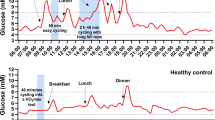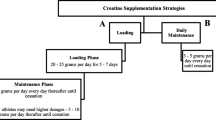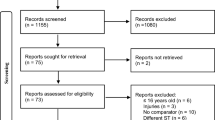Summary
The purpose of the present study was to examine the influence of high carbohydrate (CHO) diets on recovery of endurance capacity following a treadmill run to exhaustion. Two high CHO diets were used, one in which the normal diet was supplemented with complex carbohydrates and the other in which supplementation was achieved with simple carbohydrates. The thirty recreational runners who took part in this study (fifteen men and fifteen women) completed weighed food intake diaries two to three weeks before the start of the study. From an analysis of this information each subject's ‘normal diet’ was prescribed before Trial 1 and then a supplemented diet before Trial 2. The aim was to achieve an increase in carbohydrate content to 70% in the diets of the two high CHO groups and an equivalent increase in energy intake by the Control group. The subjects were required to run to exhaustion on a treadmill at a speed equivalent to 70%\(\dot V_{{\text{O}}_{{\text{2max}}} } \) on two occasions separated by 3 days. After Trial 1 the subjects were divided into three equal groups. The Complex CHO group (301±86 mg vs 507±120 mg) and Simple CHO group (265±45 mg vs 462±81 mg) increased their CHO intake by approximately 70% (p<0.05) during the 3 days before Trial 2 whereas the Control group increased their energy intake with additional protein and fat so as to match the energy intakes of the two CHO groups. The Complex CHO group improved their running time to exhaustion during Trial 2 by 26% (105.9±22.4 to 133.3±46.5 min;p<0.01) and the Simple CHO group increased their run time by 23% (114.5±15.6 to 140.6±27.0 min;p<0.01) whereas there was no significant increase in the running time of the Control group (119±19.5 to 122.4±22.4 min). There was no significant difference between the blood lactate and glucose concentrations during the two trials but the plasma FFA concentrations were significantly lower before Trial 2 for the Complex CHO group (0.41±0.15 vs 0.27±0.16 mmol−1;p<0.01) and the Simple CHO group (0.24±0.13 vs 0.19±0.09 mmol−1). The respiratory exchange ratios for the two CHO groups were significantly higher for most of Trial 2 compared with the values obtained during Trial 1. The results of this study have shown that recovery of endurance running capacity is enhanced by an increase in dietary CHO, which can be accomplished by supplementing the normal diet with either simple or complex carbohydrates.
Similar content being viewed by others
References
Ahlborg B, Bergstrom JB, Brohult J, Ekelung L-G, Hultman E, Maschio G (1967) Human muscle glycogen content and capacity for prolonged exercise after different diets. Forsvarmedicin 3:85–99
Andersen VR, Astrup A, Hede K, Nygaard E (1987) Energy metabolism in female human subjects — the influence of a fat-rich diet. J Physiol 390:125P
Astrand PO (1967) Diet and athletic performance. Fed Proc 26:1772–1777
Bergstrom J, Hultman E (1966) Muscle glycogen synthesis after exercise: an enhancing factor localized to the muscle cells in man. Nature 210:390–310
Bergstrom J, Hermansen L, Hultman E, Saltin B (1967) Diet, muscle glycogen and physical performance. Acta Physiol Scand 71:140–150
Blom PCS, Costill DL, Vollestad NK (1987) Exhaustive running: inappropriate as a stimulus of muscle glycogen super-compensation. Med Sci Sports Exerc 19:398–403
Christensen EH, Hansen O (1939) Arbeitsfähigkeit und Ernährung. Skand Arch Physiol 81:160–175
Chromy V, Gergel J, Voznicek J, Krombholzova L, Musil J (1977) Assay of serum free fatty acids by extraction-photometric procedures. Clin Chim Acta 80:327–323
Cohen L, Holliday FM (1982) Statistics for social scientists. Harper & Row Ltd, London
Costill DL, Gollnick PD, Jansson ED, Saltin B, Stein E (1973) Glycogen depletion patterns in human muscle fibres during distance running. Acta Physiol Scand 89:374–384
Costill DL, Sherman WM, Fink WJ, Maresh C, Witten M, Miller JM (1981) The role of dietary carbohydrates in glycogen synthesis after strenuous running. Am J Clin Nutr 34:1831–1836
Danforth WM (1965) Glycogen synthase activation in skeletal muscle. J Bioi Chem 240:588–593
Dill DB, Costill DL (1974) Calculation of percentage change in volumes of blood, plasma and red cells in dehydration. J Appl Physiol 37:247–248
Felig P, Cherif A, Minagawa A, Wahren J (1982) Hypoglycemia during prolonged exercise in normal man. New Engl J Med 306:895–900
Fell RD, McLane JA, Winder WW, Holloszy JO (1980) Preferential resynthesis of muscle glycogen in fasting rats after exhausting exercise. Am J Physiol 238:R328-R332
Galbo H, Holst JJ, Christensen NJ (1980) The effects of different diets and of insulin on the hormonal response to prolonged exercise. Acta Physiol Scand 107:19–32
Goforth HW, Hogdon JA, Hilderbrad RL (1980) A double blind study of the effects of carbohydrate loading upon endurance performance. Med Sci Sports 12:108A
Gollnick PD, Armstrong RB, Saubert CW, Sembrowich WL, Shepherd RE, Saltin B (1973) Glycogen depletion patterns in human skeletal muscle fibers during prolonged work. Pflügers Arch 344:1–12
Hermansen L, Hultman E, Saltin B (1967) Muscle glycogen during prolonged severe exercise. Acta Physiol Scand 71:120–139
Jakeman P, Davies B (1979) The characteristics of a low resistance breathing valve designed for the measurement of high aerobic capacity. Br J Sports Med 13:81–83
Jansson E (1980) Diet and muscle metabolism in man. Acta Physiol Scand [suppl] 487
Karlsson J, Saltin B (1971) Diet, muscle glycogen and endurance. J Appl Physiol 31:203–206
Laurell S, Tibbling G (1966) An enzymatic fluorometric micromethod for the determination of glycerol. Clin Chim 13:312–316
Lemon PWR, Dolny DG, Sherman BA (1983) Effect of intense prolonged running on protein catabolism. In: Knuttgen HG, Vogel JA, Poortmans J (eds) Biochemistry of exercise Int series on sports science, vol 13. Human Kinetic Publishers, Champaign, pp 367–372
MacDougal JD, Ward GR, Sale DG, Sutton JR (1977) Muscle glycogen repletion after high intensity intermittent exercise. J Appl Physiol 42:129–132
Maclaren D, Lanaghan K (1983) Glycogen loading and rehydration during endurance exercise. J Sports Sci 1:69A
Maehlum S, Hostmark AT, Hermansen L (1977) Synthesis of muscle glycogen during recovery after prolonged severe exercise in diabetic and non-diabetic subjects. Scand J Clin Lab Invest 37:309–316
Maughan RJ, Williams C, Campbell DM, Hepburn D (1978) Fat and carbohydrate metabolism during low intensity exercise: effects of the availability of muscle glycogen. Eur J Appl Physiol 39:7–16
Maughan RJ (1982) A simple rapid method for the determination of glucose, lactate, pyruvate, alanine, 3-hydroxybuty-rate and acetoacetate on a single 20 μl blood sample. Clin Chim Acta 122:231–240
Nygaard E, Honnens B, Tungelund K, Christensen T, Galbo H (1984) Fat as a fuel in energy turn-over of man and woman. Acta Physiol Scanda 120:51A
Olsson KE, Saltin B (1970) Variation in total body water with glycogen changes in man. Acta Physiol Scand 80:11–18
Paul AA, Southgate DAT (1978) McCance and Widdowson: The composition of foods. HMSO, London
Piehl K (1973) Time course for refilling glycogen stores after exercise induced glycogen depletion. Acta Physiol Scand 90:297–302
Pruett EDR (1970) Free fatty acid mobilization during and after prolonged severe muscular work in man. J Appl Physiol 29:809–815
Rennie MJ, Johnson RJ (1974) Effect of an exercise-diet program on metabolic changes with exercise in runners. J Appl Physiol 37:821–825
Roberts KM, Noble EG, Hayden DB, Taylor AW (1987) Simple and complex carbohydrate-rich diets and muscle glycogen content of marathon runners. Eur J Appl Physiol 57:70–74
Rodahl K, Miller HI, Issekutz B (1964) Plasma free fatty acids in exercise. J Appl Physiol 19:489–492
Sharman IM (1981) Glycogen loading: advantages but possible disadvantages. Br J Sports Med 15:64–67
Sherman WM, Costill DL, Fink W, Miller J (1981) Effect of exercise-diet manipulation on muscle glycogen and its subsequent utilization during performance. J Sports Med 2:114–118
Sherman WM, Costill DL, Fink WJ, Armstrong LE, Hagerman FC, Murray TM (1983) The marathon: recovery from acute biochemical alterations. In: Knuttgen HG, Vogel JA, Poortmans J (eds) Biochemistry of exercise Int series on sports science, vol 13. Human Kinetic Publishers, Champaign, pp 312–317
Taylor HL, Buskirk E, Henschel A (1955) Maximal oxygen intake as a measure of cardio-respiratory performance. J Appl Physiol 8:73–80
Wootton SA, Shorten M, Williams C (1981) Manipulation of dietary carbohydrate in a carbohydrate-loading regime. Proc Nutr Soc 40:3A
Author information
Authors and Affiliations
Rights and permissions
About this article
Cite this article
Brewer, J., Williams, C. & Patton, A. The influence of high carbohydrate diets on endurance running performance. Europ. J. Appl. Physiol. 57, 698–706 (1988). https://doi.org/10.1007/BF01075991
Accepted:
Issue Date:
DOI: https://doi.org/10.1007/BF01075991




